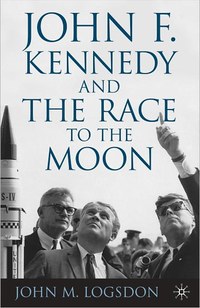Review: John F. Kennedy and the Race to the Moonby Jeff Foust
|
| During a discussion with Webb at the White House in November 1962, Kennedy famously stated, “I’m not that interested in space,” and that the only reason he supported “these fantastic expenditures which wreck our budget” is to beat the Russians to the Moon. |
In John F. Kennedy and the Race to the Moon, historian John Logsdon examines the political forces that shaped space policy in the tragically brief tenure of the Kennedy Administration. Logsdon is returning to familiar ground: in 1970 he published The Decision to Go to the Moon: Project Apollo and the National Interest, one of the first books to examine the rationale for embarking on such a risky, expensive endeavor. Why revisit the topic now? As Logsdon notes in the book’s preface, a lot of key documents from that era have been released in the intervening years; the 1970 book had been based primarily on interviews with key players and secondary sources, with the research mostly completed prior to Apollo 11 itself. And, just as important, the perspective that four decades of distance provides offers a new perspective on the events of that era and their aftermath.
Contrary to much of the mythology that sprung up around Apollo, which is still clung to by some in the space advocacy community, Kennedy was not particularly interested in space. It was not a subject he devoted much time to during his Senate career, and devoted little attention to it during the campaign and the post-election transition period. He showed little urgency in finding a new NASA administrator until after he was inaugurated, eventually selecting James Webb. He also deferred leadership of the National Aeronautics and Space Council to his vice president, Lyndon Johnson. Later in his presidency, though, when space did become a major issue, the space council did not play a major role in the decision-making process—a lesson for those who, to this day, continue to seek the reestablishment of the council.
Once space did become a major issue with Gagarin’s flight, leading to Kennedy’s speech announcing the Moon landing goal, NASA got a high level of attention, support, and funding from the administration. By 1963, though, stresses had developed on the program. Congress was cutting NASA’s budget request, and there was some skepticism whether the Soviets were, in fact, engaged in a race to the Moon with the Americans. Logsdon notes that by mid-1963 Kennedy had adjusted his rhetoric from a race mindset to one of overall national preeminence, regardless of Russian plans, an approach advocated by Webb. (During a discussion with Webb at the White House in November 1962 on this topic, made public decades later, Kennedy famously stated, “I’m not that interested in space,” and that the only reason he supported “these fantastic expenditures which wreck our budget” is to beat the Russians to the Moon.) By the fall of 1963 Kennedy was openly suggesting cooperation with the Soviet Union in human missions to the Moon in an address at the United Nations (see “Murdering Apollo: John F. Kennedy and the retreat from the lunar goal”, The Space Review, October 30 and November 6, 2006). However, a “Special Space Review” carried out in the fall of 1963—and not completed until after Kennedy’s assassination—found no reason for “backing off” the goal of a human landing on the Moon other than fiscal concerns, suggesting to Logsdon that Kennedy would have likely continued to pursue Apollo.
| The failure to repeat Apollo suggests to Logsdon that “there is little to learn from the decision to go to the Moon relevant to twenty-first century choices.” |
Apollo, Logsdon writes in the book’s conclusion, “became the twentieth-century archetype of a successful, large-scale, government-led program” rivaled by only the construction of the Panama Canal and the Interstate Highway System. In his 1970 book, Logsdon argued that the success of Apollo could serve as a template for other large-scale projects, in space or elsewhere. That has turned out not to be the case, especially in space, where efforts to duplicate Apollo have fallen flat (as NASA deputy administrator Lori Garver put it last year, “The fact is that we have been trying to relive Apollo for the last 40 years. We have not been able to recreate that since, and I am not even sure that we would want to, given even that did not provide us with a sustained presence in space.”)
Logsdon, four decades later, now believes that Apollo was perhaps something unique, a case where a set of factors “almost coincidentally converged to create a national commitment and enough momentum to support that commitment through to its fulfillment.” If that’s true, then “there is little to learn from the decision to go to the Moon relevant to twenty-first century choices.” Apollo, then, should be treated not as a model for future space efforts, but instead as an amazing achievement particular to the circumstances of its era, including the leadership provided by President Kennedy.
